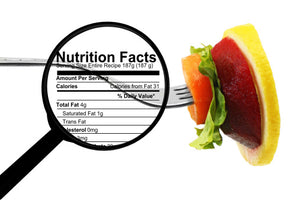Truth in Labeling: Regulation of Probiotics – Part 1
May 05, 2014

We rely a lot on regulatory authorities to help ensure that products we consume are safe and good for us. We depend upon the FDA to make sure that drug manufacturers are properly regulated and their products are safe, and we trust the USDA to keep our food safe and adequately labeled, so we know exactly what we are eating, and that it too is safe.
For instance – you may have noticed small labels on fruit & veg at the grocery stores – sometimes stuck to the produce with impossible-to-remove glue! Well, those labels have a 4 or 5-digit code on them (PLU code), and can be used to tell you a little more about the produce:
- 4 digit code (e.g. 4011) – Conventionally farmed product
- Same code prefixed with an 8 (e.g. 84011) – Genetically Engineered Product
- Same code prefixed with a 9 (e.g. 94011) – Organic Product
This is elegant in its simplicity – the regulatory authorities have put in place a system that reliably tells us about the food we eat.
Organic produce is another great example of good regulation. To be labeled as Organic, the product must be certified through a process that assures that it is free of synthetic fertilizers, harmful pesticides and genetic modification. The result: The consumer knows what they are getting, and the regulation has been effective.
Now switch to the Probiotics market – here we see a failure in consumer protection, and an example of the lack of regulation creating a plethora of products that are claiming the same benefits, but unverified and in some cases, fraudulent. There is no regulation as to what’s going on inside a bottle of probiotics.
The problem is that the FDA does not regulate probiotics as a drug, which means that probiotic manufacturers cannot make specific health condition or disease claims (known as “structure function” statements). While this may sound like a good thing, it creates an environment where anybody can create a probiotic product, make general claims like “improves digestive health”, place a disclaimer on the label stating that “These Statements Have Not Been Evaluated By The FDA”, and release them for sale to the public, perfectly legally.
This creates a problem: The consumer may not be getting the product or benefit that they have paid for, and are relying on. Some products are good, some are bad, but none are tested by an official government agency to authenticate their claims the way that conventional drugs are. The FDA wants clinical trials and testing on healthy people, but there’s no definition of what’s healthy. Reputable companies, such as Natren, have taken a scientific approach to providing a proven probiotic with the most effective strains and an effective delivery mechanism, combined with verifiable and internationally recognized production standards, while others have not. Unfortunately, these companies are few and far between.
It also means that the honest companies get the raw end of the deal. The FDA allows both honest and dishonest companies to make the same health claims, but does not verify the effectiveness of either product. As one of the honest companies, we are pretty ticked off about this situation. Watch out for our blog next week, where we will dig deeper into the unregulated world of probiotic supplements.
The post Truth in Labeling: Regulation of Probiotics – Part 1 appeared first on Natren Probiotics Blog.





Leave a comment